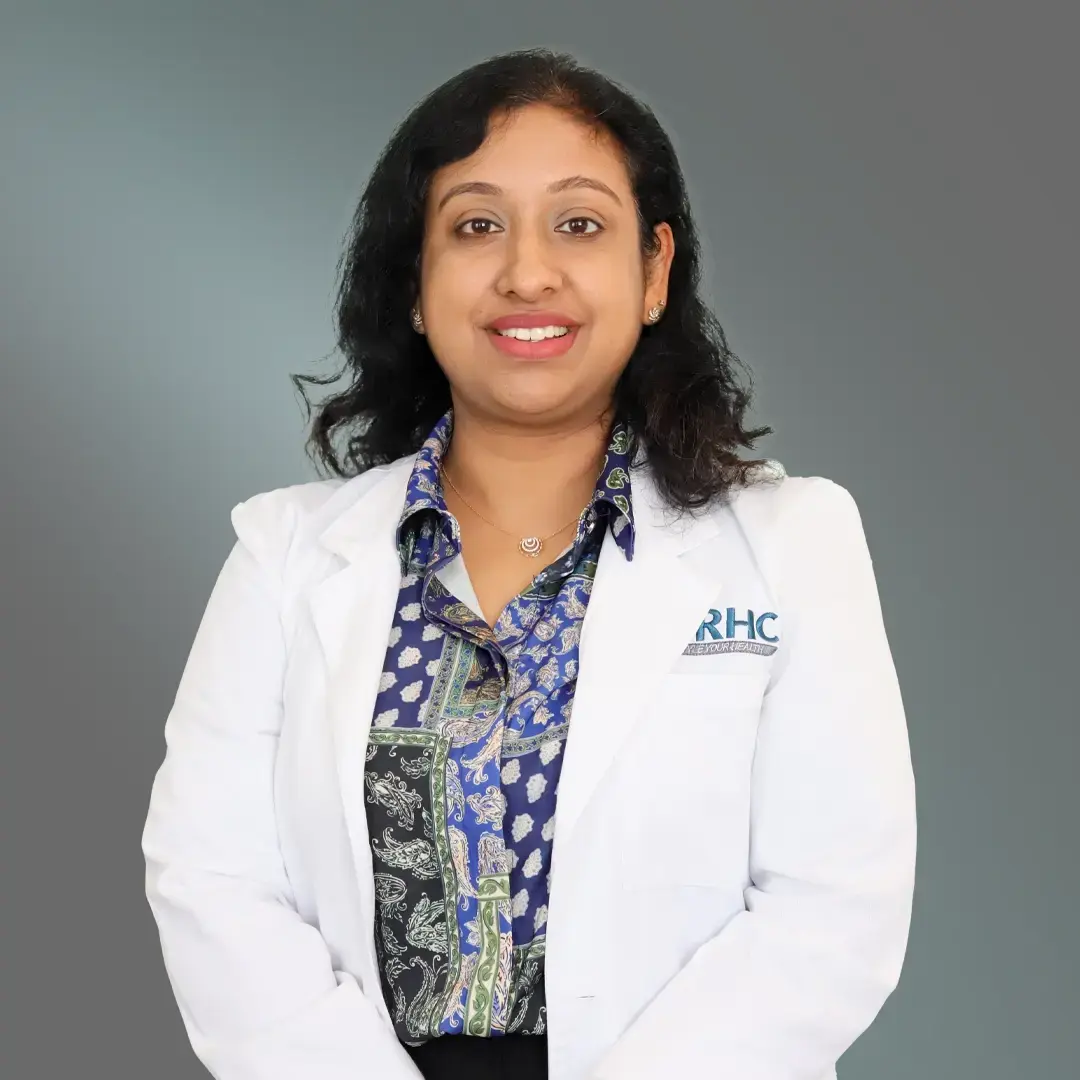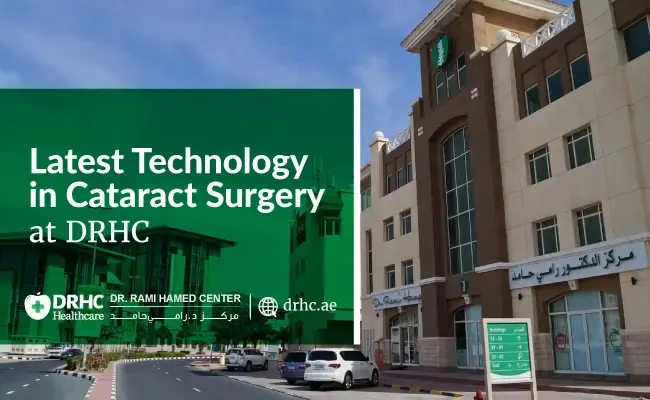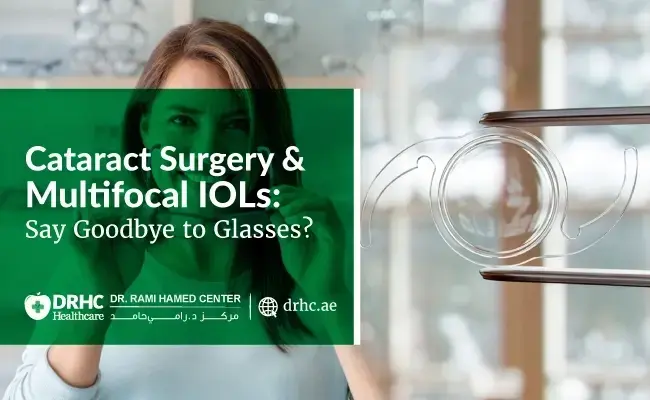
Cataract surgery is one of the most commonly performed and safest surgical procedures worldwide. It involves removing the clouded natural lens of the eye and replacing it with a clear artificial intraocular lens (IOL), restoring vision and improving quality of life.
But what happens when a patient also has another eye condition, such as glaucoma, diabetic retinopathy, macular degeneration, or keratoconus? Is cataract surgery still safe and effective?
At DRHC Dubai, our experienced ophthalmologists evaluate each patient individually to ensure the best outcomes — even in complex cases. In this article, we explore the safety and effectiveness of cataract surgery in people with other eye conditions.
Common Eye Conditions That May Coexist with Cataracts
It’s not uncommon for cataracts to occur alongside other eye diseases, especially with age. The most common co-existing eye conditions include:
- Glaucoma
- Age-related Macular Degeneration (AMD)
- Diabetic Retinopathy
- Keratoconus
- Retinal Detachment or Retinal Scarring
- Corneal Dystrophies or Scarring
- Uveitis (Inflammation inside the eye)
Is Cataract Surgery Safe for Patients with These Conditions?
Yes — in most cases, cataract surgery is safe, but the approach may be modified based on your eye health. Let’s break down how cataract surgery is managed with various coexisting conditions:
1. Cataract Surgery in Patients with Glaucoma
Special Considerations:
- Cataract surgery can lower intraocular pressure (IOP), offering benefits for glaucoma patients.
- Some patients may undergo combined cataract and glaucoma surgery (e.g., trabeculectomy or MIGS – Minimally Invasive Glaucoma Surgery).
- Preoperative and postoperative pressure management is critical.
Conclusion:
Generally safe, and may improve vision and reduce eye pressure. Surgery may be combined for optimal results.
2. Cataract Surgery in Age-related Macular Degeneration (AMD)
Special Considerations:
- Cataract surgery improves clarity but does not treat central vision loss caused by AMD.
- Pre-existing AMD can limit the amount of vision improvement expected.
- Injections for wet AMD may need to continue after cataract surgery.
Conclusion:
Safe, but visual expectations must be realistic. Patients with mild AMD may benefit the most.
3. Cataract Surgery in Diabetic Retinopathy
Special Considerations:
- Diabetes increases the risk of complications such as macular edema and poor healing.
- Careful pre-surgical evaluation of the retina is essential.
- Anti-VEGF injections or laser treatment may be required before or after surgery.
Conclusion:
Safe, with proper retinal management. Post-op follow-up is crucial for diabetic patients.
4. Cataract Surgery in Keratoconus
Special Considerations:
- Vision outcomes depend on the severity of corneal irregularity.
- Standard lens power calculations may be less accurate.
- Custom IOLs or contact lenses may still be needed post-surgery.
Conclusion:
Safe with experienced surgeons. Vision improvement may vary.
5. Cataract Surgery After Retinal Detachment or Retinal Surgery
Special Considerations:
- Surgery may be more technically complex due to previous scarring.
- The risk of retinal detachment recurrence must be considered.
- Visual recovery depends on the health of the retina.
Conclusion:
Generally safe, but complex. Surgery should be performed by a retinal-trained ophthalmologist.
6. Cataract Surgery in Uveitis Patients
Special Considerations:
- Requires inflammation control before and after surgery.
- Higher risk of complications like posterior capsular opacification and synechiae (adhesions).
Conclusion:
Safe when the uveitis is well-managed. Close monitoring is necessary.
Key Factors Influencing Safety and Outcomes
Whether or not you have another eye condition, several factors will determine how successful and safe cataract surgery is:
- Severity and control of the other eye condition
- Surgeon experience and available technology
- Preoperative testing and personalized planning
- Postoperative follow-up and management
At DRHC Dubai, we utilize advanced diagnostic tools, premium intraocular lenses, and personalized surgical techniques to handle complex cases with precision and care.
Our Related Blogs
- Is Cataract Surgery Painful?
- How Long Does Cataract Surgery Take?
- Recovery After Cataract Surgery: Tips for a Smooth Healing Process
- Vision Improvement Timeline After Cataract Surgery
- Common Side Effects After Cataract Surgery and How to Manage Them
- Eye Care Tips After Cataract Surgery: Dos and Don’ts
- When Can I Drive, Work, or Travel After Cataract Surgery?
- Can You Wear Glasses After Cataract Surgery?
Can I Expect Full Vision Restoration?
This depends on the underlying condition. For example:
- A patient with cataracts and a healthy retina can often regain near-normal vision.
- A patient with cataracts and macular degeneration may only see moderate improvement due to central vision damage.
Our ophthalmologists at DRHC Dubai will provide realistic expectations based on a thorough evaluation of your eye health.
Comprehensive Eye Care at DRHC Dubai
At Dr Rami Hamed Center (DRHC), we specialize in:
- Managing complex cataract cases with co-existing eye diseases
- Offering tailored treatment plans including premium IOLs
- Pre- and post-operative care by a multidisciplinary team
We are equipped to perform combined surgeries (e.g., cataract + glaucoma) and provide close monitoring for high-risk patients.
Book an Expert Cataract Consultation
Do you have cataracts along with another eye condition? Our experienced ophthalmologists at DRHC Dubai will provide a thorough assessment and recommend the safest, most effective treatment plan for you.
Call us at +97142798200 or visit www.drhc.ae to book your appointment.





.webp)



Leave a comment